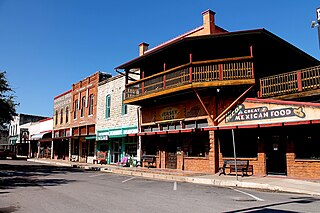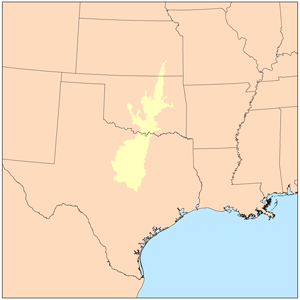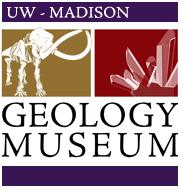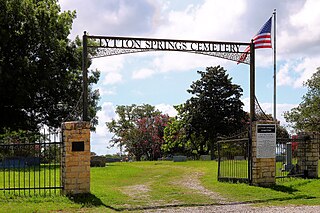
The geography of Alabama describes a state in the Southeastern United States in North America. It extends from high mountains to low valleys and sandy beaches. Alabama is 30th in size and borders four U.S. states: Mississippi, Tennessee, Georgia, and Florida. It also borders the Gulf of Mexico.

Chalk is a soft, white, porous, sedimentary carbonate rock. It is a form of limestone composed of the mineral calcite and originally formed deep under the sea by the compression of microscopic plankton that had settled to the sea floor. Chalk is common throughout Western Europe, where deposits underlie parts of France, and steep cliffs are often seen where they meet the sea in places such as the Dover cliffs on the Kent coast of the English Channel.

Meteor Crater, or Barringer Crater, is an impact crater about 37 mi (60 km) east of Flagstaff and 18 mi (29 km) west of Winslow in the desert of northern Arizona, United States. The site had several earlier names, and fragments of the meteorite are officially called the Canyon Diablo Meteorite, after the adjacent Canyon Diablo.

Hood County is a county in the U.S. state of Texas. As of the 2020 census, the population was 61,598. Its county seat is Granbury. The county is named for John Bell Hood, a Confederate lieutenant general and the commander of Hood's Texas Brigade.

Erath County is a county located in the U.S. state of Texas. According to the United States Census bureau its population was 42,545 in 2020. The county seat is Stephenville. The county is named for George Bernard Erath, an early surveyor and a soldier at the Battle of San Jacinto.

Greensburg is a city in, and the county seat of, Kiowa County, Kansas, United States. As of the 2020 United States census, the population of the city was 740. It is home to the world's largest hand-dug well.

Santa Anna is a town in Coleman County in Central Texas, United States. Its population was 1,014 at the 2020 census.

Dublin is a city located in southwestern Erath County in Central Texas, United States. Its population was 3,359 at the 2020 census, down from 3,654 at the 2010 census.

Stephenville is a city and county seat of Erath County, Texas, United States. It is on the North Bosque River, which forms nearby. Founded in 1854, it is home to Tarleton State University. Stephenville is a small town located in Central Texas, as of the 2020 census, the city's population was 20,847, and it is the principal city in the Stephenville Micropolitan Statistical Area. Stephenville is among several communities that call themselves the "Cowboy Capital of the World".

Fairfield is a city and county seat of Freestone County, Texas, United States. The population was 2,850 at the 2020 census, down from 3,094 at the 2000 census. It was founded in 1851.

Hico is a small city located in Hamilton County in central Texas, United States. The population was 1,335 at the time of the 2020 census, down from 1,341 in the 2010 census. Over the years, it became a cattle and cotton market. Today, ranching and tourism dominate the local economy.

Centerville is a city in Leon County, in the U.S. state of Texas. The population was 905 at the 2020 census. It is the county seat of Leon County. Centerville was so named as it is near the geographic center of Leon County.

Oakwood is a town in Leon and Freestone counties in the U.S. state of Texas. The population was 389 at the 2020 census. It was founded in 1872 as a stop on the International Railroad.

The term Cross Timbers, also known as Ecoregion 29, Central Oklahoma/Texas Plains, is used to describe a strip of land in the United States that runs from southeastern Kansas across Central Oklahoma to Central Texas. Made up of a mix of prairie, savanna, and woodland, it forms part of the boundary between the more heavily forested eastern country and the almost treeless Great Plains, and also marks the western habitat limit of many mammals and insects.

The UW–Madison Geology Museum (UWGM) is a geology and paleontology museum housed in Weeks Hall, in the southwest part of the University of Wisconsin–Madison campus. The museum's main undertakings are exhibits, outreach to the public, and research. It has the second highest attendance of any museum at the University of Wisconsin–Madison, exceeded only by the Chazen Museum of Art. The museum charges no admission.
The 2009 Latvian meteorite hoax was a publicity stunt in which Swedish-based telecommunications company Tele2 staged an apparent meteorite landing which was later revealed to be fake.

Lytton Springs is an unincorporated community in northeastern Caldwell County, Texas, United States. According to the Handbook of Texas, the community had a population of 500 in 2000. The community is located within the Greater Austin metropolitan area.

Khvalynsky National Park encompasses a raised plateau of chalk hills of the Volga Uplands, covered in mixed oak-linden and conifer forests, along the west side of the Volga River. It is about 1,000 km north of the Caspian Sea, in Saratov Oblast overlooking the Saratov Reservoir. The northern end is about 10 km west of the city of Khvalynsk, and about 200 km northeast of Saratov on the Volga. About 25,524 hectares in size, Khvalynsky is spread over three sections. The park was officially formed in 1994.

Kremenets Mountains National Nature Park covers a cluster of mountains and ridges in the Hologoro-Kremenetskiy range of the Podolian Upland in west central Ukraine. Administratively, the park is in Kremenets Raion in Ternopil Oblast.

Manfred Cuntz is a German astrophysicist based in the United States since 1988. He is a Distinguished Professor of physics at the University of Texas at Arlington (UTA). His primary research interests include stellar astrophysics, astrobiology, and planetary habitability. In 2023, he became a fellow with the Committee for Skeptical Inquiry.






















